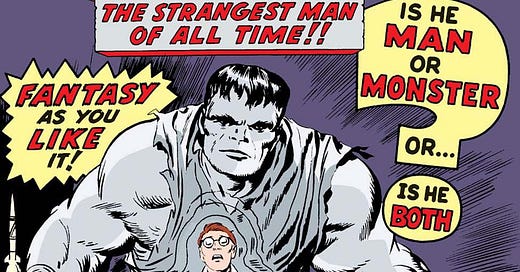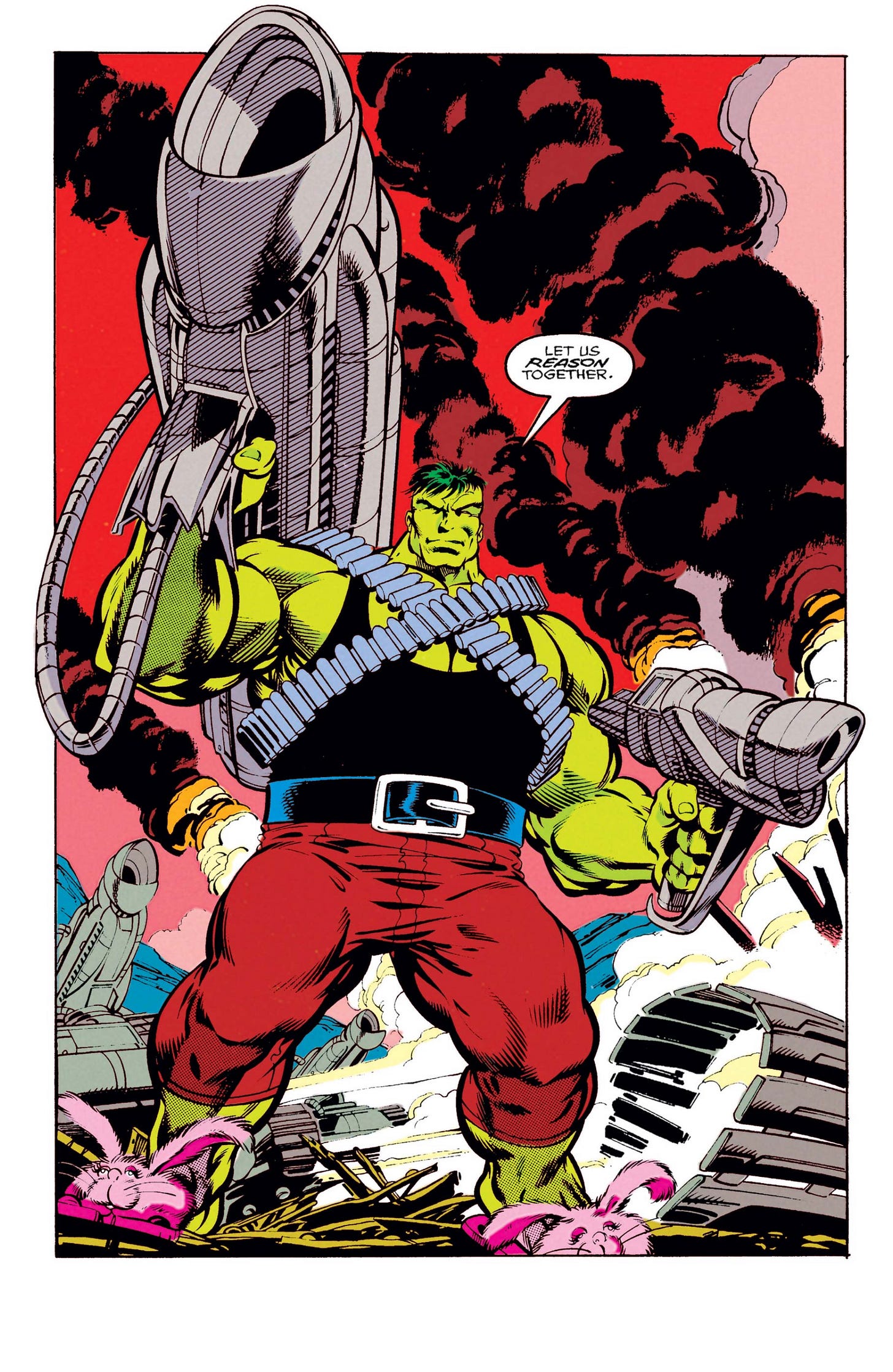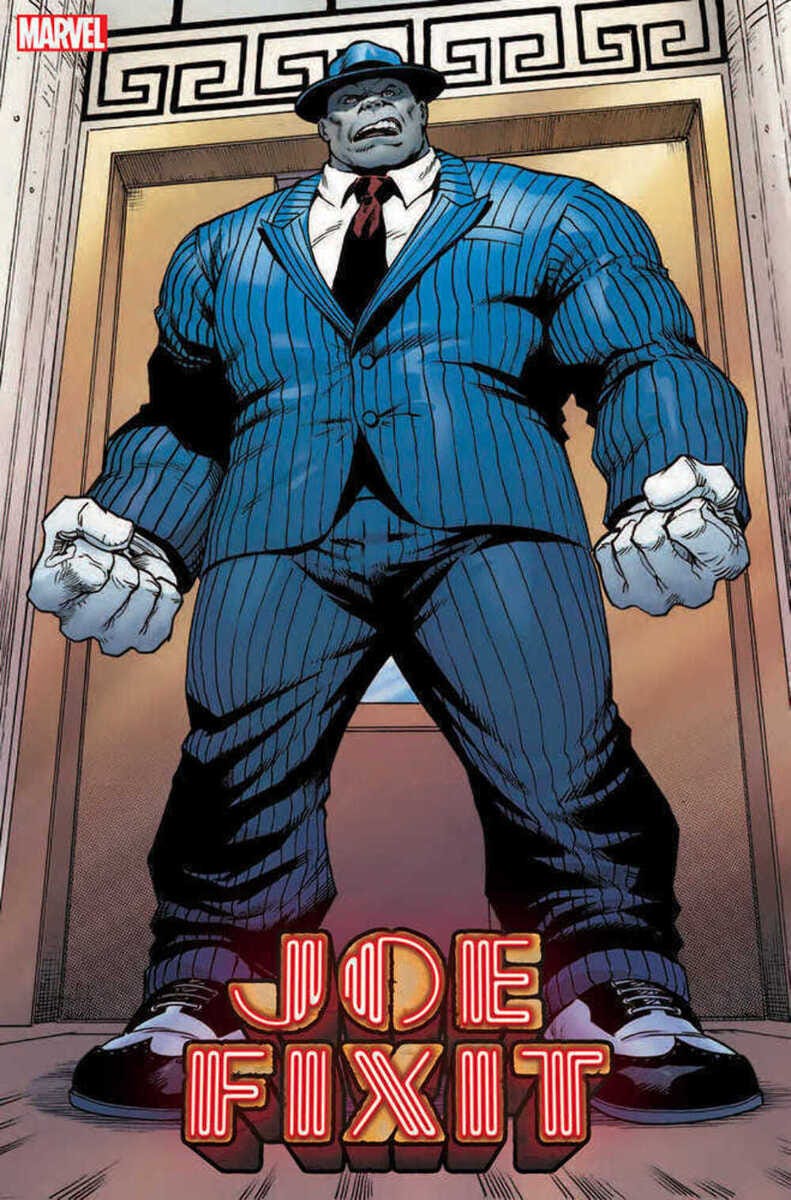Last month Peter David, one of the leading comics writers of my generation, passed away. My generation has reached the time in our lives when we are watching our contemporaries begin to leave us. As a comics historian I see it as my duty to write about the comics creators of my generation and their works, to help see that newer generations learn about them and to help ensure that those works endure.
Peter David was extraordinarily prolific, writing not only comics but novels, teleplays and a memoir. Among his many comics credits, he is probably best known for his dozen year run on “The Incredible Hulk,” a series whose sales had slumped before he took over and revitalized it both creatively and commercially.
With “The Incredible Hulk” Peter took an approach that I like best for long running legacy characters. He was a classicist, remains true to the work of his great predecessors like the Hulk’s creators Stan Lee and Jack Kirby. But he was also an innovator, taking these great characters in unexpected new directions that nonetheless remained true to their essence.
In the case of the Hulk Peter focused on the original concept that the Hulk was a being with multiple personalities. Stan Lee himself declared that the Hulk was partly inspired by Dr. Jekyll and Mr. Hyde.
The basis for the entire series is Stan Lee and Jack Kirby's origin for the Hulk in “The Incredible Hulk” #1, back in 1962. In it Dr. Bruce Banner is a nuclear physicist who has invented a “gamma bomb” for the U. S. military. He is mild-mannered, introverted, scholarly, too shy to act on his attraction to Betty Ross, and too timid to defy her dominating father, his boss General “Thunderbolt” Ross.The bomb not only has tremendous explosive force but it unleashes deadly gamma radiation. As the bomb is about to be tested, Banner sees a teenager, Rick Jones, drive out to the test site. Banner orders the countdown to be paused, but an undercover enemy spy ignores the order. Banner manages to get Jones to safety but is himself hit by the full force of the detonating bomb. Yet instead of being killed, Banner is instead transformed into the super-powerful Hulk. In personality the Hulk is the opposite of Banner: violent, aggressive, easily angered.
After seeing the film “Oppenheimer” in 2023, I found myself wondering if Lee and Kirby intended Banner to be an analogies to J. Robert Oppenheimer, a co-creator of the atom bomb who came to regret how governments used it.
Another important source for Peter David’s treatment of the Hulk was the work of writer Bill Mantlo, one of his predecessors on the series. Mantlo established that as a child Bruce Banner had been physically and psychologically abused by his brutal fat her Brian Banner. As a result Bruce's personality became fragmented. The gamma ray blast caused the violent side of Banner’s fragmented personality to take physical form as the Hulk.
Peter David’s principal innovation in writing “The Incredible Hulk” was to devise new variations on the character’s multiple personality syndrome. Peter wasn’t interested in writing the traditional version of the Hulk, with his limited intellect, continual rages and shouts of “Hulk smash!” Instead, he gave Banner / Hulk new personalities that offered entirely new story potential.
One of the best known of these is popularly called “Professor Hulk.” This was a version of the Hulk that merged Bruce Banner’s intellect and moral sense with the Hulk’s body and super-strength. This Hulk even looked more handsome, rather than like a grotesque monster. “Professor Hulk” acted as a genuine superhero, and for a long time worked with the Pantheon, an organization of super-powered beings. Maybe you could see this version of the Hulk as analogous to muscular action-adventure movie stars like Arnold Schwarzenegger? In the Marvel Cinematic , Universe the traditional brutish Hulk appears in the first three “Avengers” movies, but has turned into “Professor Hulk” in “Avengers: Endgame.”
The other most celebrated version of Peter David’s Hulk is known as Joe Fixit. This version ultimately derives from ”The Incredible Hulk” #1, in which the Hulk was originally colored gray. By issue 2 Stan Lee had changed his mind and made the Hulk green. In the earliest issues of “The Incredible Hulk” the character was smarter and more articulate than what the traditional Hulk became. Although the early Hulk was superhumanly strong, he did not have the potentially unlimited strength that the traditional Hulk would have.
Before Peter David took over writing “The Incredible Hulk,” the Hulk had reverted to his original gray form. Peter eventually turned this version of the Hulk into Joe Fixit, an enforcer for an organized crime figure based in Las Vegas. Wearing a suit instead of the Hulk’s traditional ragged pants, Joe Fixit was more like a gangster out of 1930s and 1940s movies.
Yet another of Peter David’s versions of the Hulk focused on the Hyde side of Banner -Hulk. This was the Maestro, who represents the darkest potential of Banner/Hulk. Like Professor Hulk, the Maestro combines Banner’s genius intellect with the Hulk’s potentially unlimited power. But whereas the Professor Hulk synthesis was heroic, seeking to aid humanity, the Maestro represents a human being’s potential for domination and tyranny.
In his stories with the Maestro, Peter David expressed the dark side of his vision of humanity and its destiny. There was another side to Peter’s work, which could also be lighthearted and optimistic. But this week we are examining the deeply pessimistic side of his creative vision.
Peter David introduced the Maestro in “Hulk: Future Imperfect,” a two part comics series drawn by the late George Perez, one of the greatest superhero comics artists of my generation. But years later Peter David wrote a prequel, the “Maestro” mini-series, that showed how and why the Hulk assumed this new persona.
In “Maestro” Peter David depicted an alternate reality in which the smart “Professor Hulk” version of the character awakens after spending nearly a century in suspended animation. He soon discovers that most of the human race had been wiped out by nuclear war. Peter David firmly makes the point that no super-villain was responsible for this worldwide massacre. Ironically, the continually battles of the Marvel super heroes against super-villains like Doctor Doom had nothing to do with the end of most of the human race. Instead, as David emphasizes in both “Maestro” and “Future Imperfect,” humanity destroyed itself. And all the superheroes were helpless to stop this disaster and are now dead. The Hulk reflects that likewise the superheroes could not stop the 9/11 attacks or the many school shootings in the early 21st century. All of these he seems to regard as symptoms of humanity’s urge towards self-destruction.
This leads the Hulk to a grim conclusion: that the superheroes could not save humanity if humanity was determined to destroy itself. According to this alternate history it was terrorists who manipulated the nuclear powers into waging this worldwide conflagration, but the Hulk believes that if they hadn’t provoked the war, the world’s governments would have eventually launched World War II anyway.
This is deeply pessimistic about the fate of humankind. Are World War III and the nearly total annihilation of the human race our inescapable fate? Just like death itself is inescapable?
The Hulk is still understandably bitter about how the human race treated him as a monster and persecuted him. On discovering that most of humanity had been wiped out by humanity itself, the Hulk feels no empathy for the deceased. He thinks they got what they deserved for mistreating him. This Hulk is a misanthropic narcissist lacking in any empathy.
But of course not everyone was responsible for World War III. There were surely many millions of people who were opposed to starting a war. Similarly, why should everyone be held responsible for persecuting the Hulk? Even if indeed most people considered the Hulk to be a monster, his past rampages gave them plenty of reason to think so.
But this Hulk sees things in absolute black and white, not grey. In his mind everyone is guilty of the supposed crimes against him. Only his point of view counts. And so this Hulk is also a budding authoritarian ruler who decides that what is left of humanity needs the imposition of order by himself.
At first this Hulk seeks the support of the citizenry, promising to make their country great again. This echoes a certain present day president's catchphrase. But by now we are well aware that the Hulk actually despises the people whose support he seeks. And when the people do not respond, the Hulk gives up the masquerade of pretending to care about the people and takes control by force.
What was once New York City is now named Dystopia. That name is rather too obvious. It is ruled by the god Hercules, a familiar figure from the Marvel Universe who survived the deaths of the superheroes. He has taken the title “Maestro.” I suppose that's appropriate: Hercules was a god of ancient Rome, and “Maestro” is an Italian word.
The Hulk murders Hercules, not through fair combat but with poison gas. Then the Hulk assumes the title of Maestro and takes over Dystopia. In the series the now quite elderly Rick Jones confronts his new former friend, the Hulk. Jones says that the abuse that Bruce Banner suffered at his father's hands has resulted in Bruce as the Hulk becoming just like his father: cruel, domineering, lacking in empathy for other people.
This raises a disturbing question. Peter David's “Professor Hulk” was portrayed in “The Incredible Hulk” comics as genuinely heroic. But was Peter David saying that it was inevitable that Bruce Banner's psyche, damaged by his father's abuse, would inevitably become just like his inhumane father? Again, is there no escaping one’s dark fate, a fate that was imposed by another?
The saga of the Maestro continues in “Hulk: Future Imperfect.” In this story the then-present day Hulk, the heroic “Professor Hulk,” travels through time to the Maestro’s alternate future. There Professor Hulk is appalled to see what this alternate reality version of himself has become: a ruthless tyrant. “Professor Hulk” also encounters the elderly version of Rick Jones, who presides over a museum of relics of the superheroes of the past, all now dead. George Perez’s lovingly detailed depiction of this museum is a wonder to behold.
This Professor Hulk does not succumb to the temptation to become like his older evil “twin,” the Maestro. Instead he finds a way to defeat and destroy his alternate self. Using one of the relics of the age of superheroes, Doctor Doom’s Time Machine (from Doctor Doom’s first appearance in “Fantastic Four” #5 in 1962), he sends the Maestro back in time to the point of the Hulk’s origin. The Maestro is annihilated by the same gamma bomb explosion that had originally turned Bruce Banner into the Hulk.
Peter David thus brought the Hulk’s story full circle. Bruce Banner’s creation of the gamma bomb was his original sin, and its detonation transformed him into an avatar of destruction, as powerful as the bomb itself, the living incarnation of nuclear power. The Maestro represents the use of that power to dominate or destroy humanity. In being consumed by the blast of the bomb that he himself created, the Maestro pays for Banner’s original sin.
One could say that the end of “Hulk; Future Imperfect” also represents Banner / Hulk’s purging himself of his evil side. The sinister Maestro is destroyed; the good Professor Hulk survives. So there is by this account hope for both Banner and the human race.
And yet Peter David came up with an even darker vision of the Hulk and of humanity’s destiny, one without a glimmer of hope, as we shall see next time.












